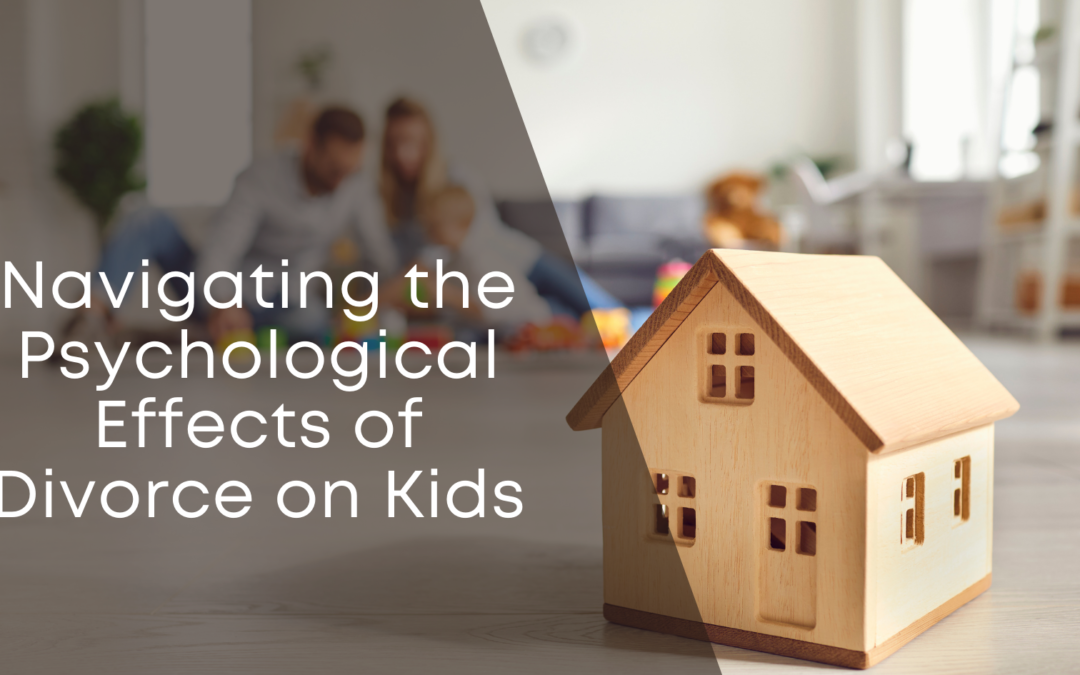Divorce isn’t easy. And when children are involved, it can be even harder. Imagine the scene: a young child, eyes wide with confusion and fear, clinging to a parent, trying to understand why their world is changing. The truth is, divorce impacts most kids psychologically — no matter how peaceful the divorce is. But there are ways to minimize this impact and help your kids navigate this challenging time. Let’s explore how divorce affects children and what you can do to support them.
The Central Problem
Divorce is a significant life event that disrupts the family structure. Children may experience changes in their living arrangements, schooling, and daily routines, creating a sense of instability and insecurity. For parents, the emotional toll of divorce can be overwhelming, with guilt, anxiety, and sadness being common feelings. They may worry about their children’s well-being and question their own ability to provide the necessary support, adding to the stress and making it harder to help their children cope. It feels unfair and wrong that children should suffer because of their parents’ decisions. Every child deserves a stable, loving environment, and the disruption of divorce seems to rob them of that security. But it doesn’t have to be this way. There is a different path that can lead to a healthier adjustment for everyone involved.
A New Way Forward
Hi, I’m Steven Unruh, a divorce mediator with more than 30 years of experience. I’ve seen firsthand the toll divorce can take on families, especially children. But I’ve also seen how effective mediation and a focus on cooperative co-parenting can make a significant difference. Here’s how you can help your kids navigate this difficult time.
1. Co-Parent Peacefully
Manage conflict with your ex-spouse in a healthy way. Parental conflict is detrimental to a child’s mental health, so avoid criticizing or bad-mouthing the other parent in front of your child. Mediation can facilitate healthier communication and conflict resolution, making co-parenting more peaceful and effective. By maintaining a respectful relationship with your ex-spouse, you can create a more stable and supportive environment for your child, helping them adjust better to the changes brought by divorce. Prioritizing peaceful co-parenting ensures that your child’s well-being remains the focus.
2. Maintain Healthy Relationships
Maintain healthy relationships by working on a positive bond with your child. Strive for open communication, paying close attention to their feelings and empathizing with them. A strong parent-child relationship provides much-needed stability and security during and after a divorce. Make time to connect regularly, listen actively, and validate their emotions. Encourage your child to express themselves and reassure them of your love and support. This consistent effort to maintain a healthy relationship can significantly help your child cope with the changes and challenges of divorce, fostering their emotional well-being.
3. Teach Coping Skills
Teach coping skills to help your child manage stress effectively. Encourage them to engage in activities they enjoy and find relaxing. For older children, mindfulness exercises such as deep breathing or meditation can be beneficial. Younger children might need more physical outlets like playtime or outdoor activities. Foster a supportive environment where your child feels comfortable expressing their feelings. Guide them in identifying healthy ways to cope with stress, whether through creative pursuits, physical activity, or simply talking about their emotions. These skills will help them navigate the challenges of divorce with greater resilience.
4. Take Care of Yourself
Take care of yourself to positively impact your child’s well-being. Seek support from friends, family, or a therapist, and find ways to relax and de-stress. When you prioritize your own health and well-being, you’re better equipped to provide the emotional and physical support your children need during the challenging times of divorce. Remember, a healthy and happy parent can more effectively help their children navigate their own emotions and stress, creating a more stable and supportive environment for everyone involved.
5. Consider Professional Help
Consider professional help if your child shows signs of severe emotional distress. Therapists are trained to provide the necessary support, helping children understand and navigate their feelings. They can also assist in developing healthy coping mechanisms tailored to your child’s needs. Seeking professional help ensures that your child has a safe space to express their emotions and learn strategies to manage the challenges of divorce
Take Action Now
You might be thinking, “This all sounds great, but my situation is too complicated.” Or perhaps, “Mediation won’t work for us; we can’t even speak civilly to each other.” It’s understandable to feel this way, but know that mediation is designed to handle even the most contentious situations. It provides a structured environment where both parties can express their needs and work towards a solution that benefits the children.
Divorce doesn’t have to leave lasting scars on your children. By taking proactive steps, you can help them cope and emerge stronger. Start by scheduling a free consultation with me, Steven Unruh. Together, we can create a plan that prioritizes your children’s well-being and sets the stage for a healthier, happier future.
Let’s work together to turn this challenging time into an opportunity for growth and healing. Schedule your free consultation today and take the first step towards a better future for your family.


Recent Comments